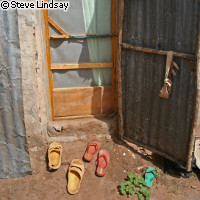House screening can cut malaria cases, study reveals
Screening houses to stop mosquitoes getting in at night helps to cut malaria transmission by 50%, according to a new study published in The Lancet. Malaria has been in decline in many parts of tropical Africa since 2001, largely thanks to the widespread use of insecticide-treated bed nets and treatment with artemisinin-based combination therapy. However, resistance to the insecticides and drugs is on the rise, making the hunt for alternative malaria prevention methods all the more urgent. Until now, the use of screens has been largely ignored. In this study, scientists in the Gambia and the UK sought to redress the balance. They tested two types of screening systems in households in the Gambian town of Farafenni. The Gambia is a good place to test house screens because 80% of malaria victims are infected after being bitten indoors, at night, by the Anopheles gambiae mosquito. In some houses in the trial, screens were fixed to the doors and windows and any holes in the eaves were filled in. In other houses, net ceilings were fitted, and a third group of houses was left without screens for comparison. Light traps set inside the houses revealed how many insects got through the screening systems. Inhabitants' haemoglobin concentration was measured, and the prevalence of anaemia and parasites in children were also assessed. Both screening methods proved to be effective at reducing malaria transmission. Furthermore, children living in screened homes were 50% less likely to suffer from anaemia than children in non-screened households. Full screening was more effective than the ceiling nets, suggesting that many mosquitoes come in through the doors and windows. Even in fully screened houses, around 30 mosquitoes were trapped every night. The scientists believe that this could be because screened doors are usually propped open during the day, with householders only shutting them at around 7 or 8 o'clock in the evening. The researchers speculate that these mosquitoes could have entered the houses earlier in the evening, and suggest that further reductions in disease transmission could be achieved if householders shut their doors sooner. The trial participants were largely happy with the screening systems. As well as protecting them from insect bites, they reported that the screening increased their privacy and improved the appearance of their homes. Another benefit of screening is that its protection covers everyone inside the house. The screens were easy to make using local materials, and were fitted by local carpenters following a standard blueprint. The researchers note that the effectiveness and durability of the screens could be further improved by modifying the materials and design slightly. On the cost front, the screens have a similar per person cost to insecticide-treated bednets and indoor spraying. The authors of the paper state that screening should be used to augment, rather than replace, insecticide-treated bednet use. 'House screening could be easily incorporated into integrated vector management programmes, and because it does not rely on insecticides, it could be particularly beneficial in areas where insecticide resistance develops,' the team wrote. 'Our findings show that screening homes is a cheap, simple public health intervention that can save lives,' said Professor Steve Lindsay of Durham University in the UK. 'Mosquito-proofing homes is one of the principal tools that has been associated with protection against malaria, yet it has been ignored during long-term anti-malarial drug- and insecticide-driven campaigns.' Malaria remains a serious problem in many parts of the world; in Africa alone, a child dies from the disease every 30 seconds, and it also accounts for 40% of public health spending in Africa.
Countries
The Gambia, United Kingdom



